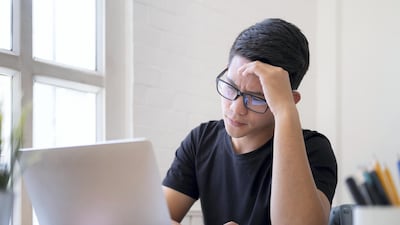Children studying for their GCSE’s suffered the most from Covid-19 school closures and faced heightened difficulties learning from home, a study of more than 62,000 pupils found.
The research by ImpactEd, a non-profit organisation that works to improve educational outcomes for children, said girls experienced greater anxiety about returning to the classroom after the first lockdown and summer holidays last year.
Disadvantaged schoolchildren were also less likely to say they understood their work.
The report's authors said "post-lockdown support should be carefully evaluated to ensure that pupils who come from economically disadvantaged backgrounds are benefiting".
Dame Sue John, the executive director of education charity Challenge Partners, said teachers and children were used to often incremental change, but nothing like the substantial shift that had taken place in the past year.
“This last year has disrupted the pattern," she said. "Schools have been faced with rapid change writ large, complete with its own vocabulary of remote learning; lateral flows and bubbles broken or breached.
“Teachers and their schools have been at the heart of a national conversation about how the country deals with the most significant crisis in a generation.”
The research by ImpactEd found that three in 20 GCSE pupils, who are typically 15 or 16 years old, regularly didn't understand the work set for them, while one in four said they couldn't get help from their family if they needed it.
Nearly 40 per cent struggled to find a suitable learning routine – a much higher figure than for younger pupils.
But the study also showed they continued to face issues when they returned to school, with many seeing an increase in anxiety and problems with their overall well-being in the period.
About one in three girls worried about returning to school, nearly double that of boys. Overall, girls had lower well-being scores and were more likely to report concerns about the impact of Covid-19 on their education and feelings of isolation.
“Schools should consider whether girls may need more support in managing their anxiety,” the report’s authors said. “For both girls and boys, consistent routines for learning and opportunities for teacher-pupil interaction were seen as beneficial for well-being.”
Despite this, young people were more likely to feel positive rather than negative about returning to school after the summer holidays – with the trend more apparent in primary school pupils.
“When asked about what would make their return to school easier, the most popular answer was ‘not having lots of pressure to catch up’: 57 per cent of pupils selected this option. As ‘catch-up’ strategies are planned, educators should be careful of inadvertently reinforcing anxieties that young people may have about lost learning,” ImpactEd said.


